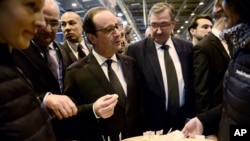Bigger droughts, more frequent flooding, more devastating storms — these are some of the effects that climate change is already having on our planet. And farmers, many of them small, family growers in developing countries, are on the front lines. They'll have to feed a world population that is expected to climb from just over 7 billion today to about 9.6 billion in 2050.
Jose Graziano da Silva, director-general of the U.N. Food and Agricultural Organization, said agriculture must become more sustainable, more resilient and more inclusive to respond to climate change — and to ensure that the poorest people have access to food.
"Always, the poorest and the smallest are the most vulnerable," he said, "starting from the fact they are already in marginal awareness, so they are the first to be affected by a drought or a flooding that are the current, ongoing impacts of climate change."
The FAO chief spoke Friday at an international meeting in Paris looking at the impact of climate change on agriculture. The city, which opened its yearly international agricultural show Saturday, will host a major U.N. climate conference in December intended to reach an international deal to cut greenhouse gas emissions.
At the agricultural meeting, French President Francois Hollande said the U.N. summit would not solve all the climate change problems, but it must at least give the world a reason for hope. It is important to define a global strategy to fight climate change, he said, and agriculture must be part of the solution.
Evelyn Nguleka of Zambia, president of the World Farmers Organization, told VOA that farmers are looking for practical solutions.
"It's one thing just to send out an alarm that there are going to be weather pattern changes," she said. "But what is important for the farmer is how is a farmer going to be able to survive. So resilience is going to be a key word — and that, of course, goes with innovations."
Nadjirou Sall of northern Senegal heads the Network of Farmers' and Agricultural Producers' Organizations of West Africa, known by the acronym ROPPA. He said the Sahel region, where he lives, has been dealing with longer droughts for several decades.
Sall said the Paris climate conference will be useful if it takes the problems of family farmers like himself into account. If not, as far as he is concerned, it will be a failure.




